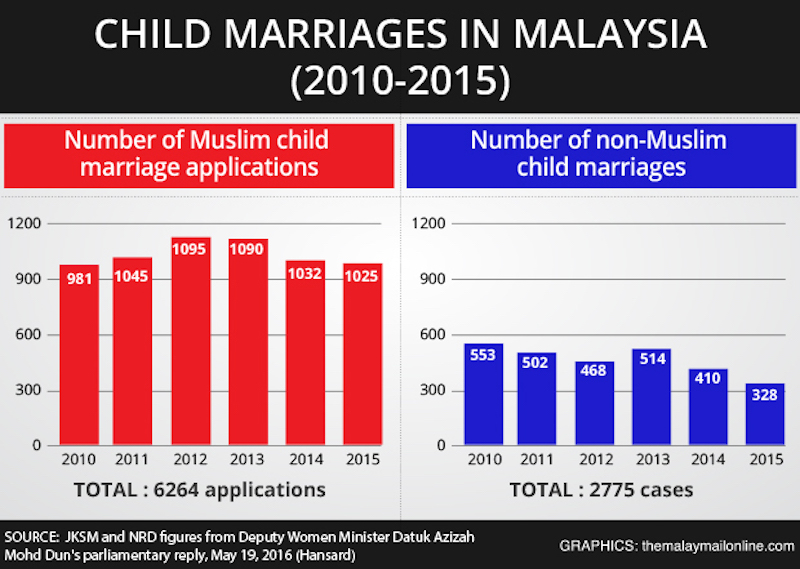KUALA LUMPUR, July 2 — A uniform legal age of marriage at 18 will only become a reality if all state legislative assemblies amend their respective Islamic Family Law Enactments, legal experts said.
Constitutional lawyer Lim Wei Jiet said this was because jurisdiction on Muslim marriage fell under Item 1 of the State List in the Federal Constitution, making it solely the purview of the state governments.
“It means that the rest of the individual states (with the exception of Labuan, Kuala Lumpur and Putrajaya) would have to amend their respective enactments governing Muslim marriages,” he told Malay Mail.
According to federal civil law, the legal minimum age of marriage is at 18 for both genders, but non-Muslim girls aged 16 can still get married with approval from the mentri besar. Non-Muslims however cannot marry below 16.
Under state Islamic laws, the marriageable age is 18 for boys and 16 for girls, but the Shariah courts hold the authority to give consent to those under the permitted age to get married. There is no minimum age of marriage for Muslims.
 Lim said Parliament can make a similar amendment to Section 8 of the Islamic Family Law (Federal Territories) Act 1984, which governs Muslim marriages in the Federal Territories.
Lim said Parliament can make a similar amendment to Section 8 of the Islamic Family Law (Federal Territories) Act 1984, which governs Muslim marriages in the Federal Territories.
The Section reads: “No marriage may be solemnised under this Act where either the man is under the age of eighteen or the woman is under the age of sixteen except where the Shariah Judge has granted his permission in writing in certain circumstances.”
Lim said the amendments to the state Islamic Family Law Enactments and to the Islamic Family Law in the Federal Territories should seek to remove the Shariah courts’ power to grant special exceptions to underage marriage.
“The state legislatures are already in the same spirit, setting the minimum age for females at 16 years old but the only step now is to not allow any exceptions by the Shariah courts.
“There should be no exceptions if the principle is to protect a child from entering into a life-changing, irreversible relationship which he or she has no agency to decide in the first place,” he said.
Lim said if Pakatan Harapan (PH) was truly committed, the amendments could “easily be done” in PH states including Selangor, Penang, Negri Sembilan, Johor and Melaka.
“State legislatures only require a simple majority to amend state enactments governing Islamic family law.
“It may be a bit tricky in Kedah and Perak where there is only a slim majority and where PAS may actually object to such amendments,” he said.
Besides those seven states governed by PH that also has federal power, an alliance of PH and Parti Warisan Sabah controls Sabah. Kelantan and Terengganu, on the other hand, are governed by PAS and do not have a single state or federal representative from PH.
Another lawyer, Nizam Bashir, echoed the same sentiment, adding that the government should impose an equal, if not more, scrutiny on laws governing marriages.
“Legally a person below the age of 18 cannot smoke, drink or vote. Marriage is something more weighty as compared to that, yet we seem to be more prepared to countenance the marriage of a child.
“If it is feasible to place a minimum age for smoking, drinking and voting, then it would be equally feasible to place a minimum age for marriage.
“A child should be encouraged to explore all opportunities that the world has to offer especially where education is concerned,” he said.
Lawyer Surendra Ananth said Parliament should instead enact a criminal law to prohibit child marriage, which would then render all state Shariah laws unconstitutional.
“Child marriage cannot be considered as ‘personal law’. If such a criminal law is enacted, all state Shariah laws would contravene a federal law, rendering them unconstitutional.
“Amending each Shariah law in each state is one way but it would fall within the discretion of each state legislative assembly.
“My view is that it is better for Parliament to take a stand by way of a criminal law to prohibit child marriage,” he told Malay Mail.
He said another way to impose a total ban on child marriage was by arguing that any state Shariah law that allowed the marriage was a contravention of Articles 5, 8 and 10 of the Federal Constitution.

The three Articles speak about Malaysians’ fundamental rights to liberty, equality and freedom of speech, assembly and association, respectively.
“State Shariah laws that are inconsistent with fundamental rights are void. However, this required a pronouncement from the civil courts. It requires judicial intervention,” he said.
Child marriage is currently in the spotlight after a 41-year-old Kelantanese man took an 11-year-old Thai girl as his third wife in southern Thailand last month.



















